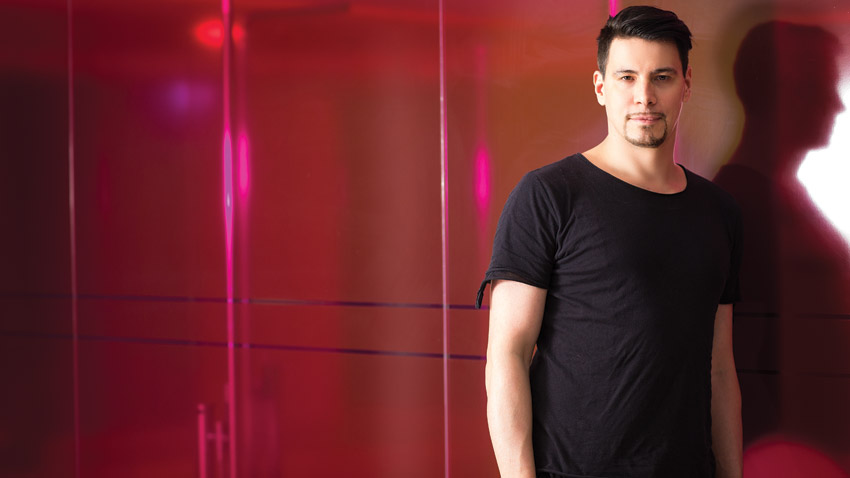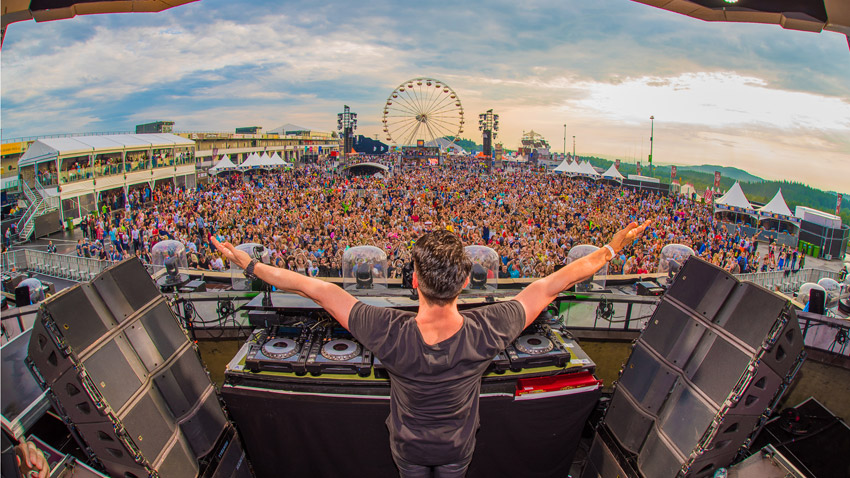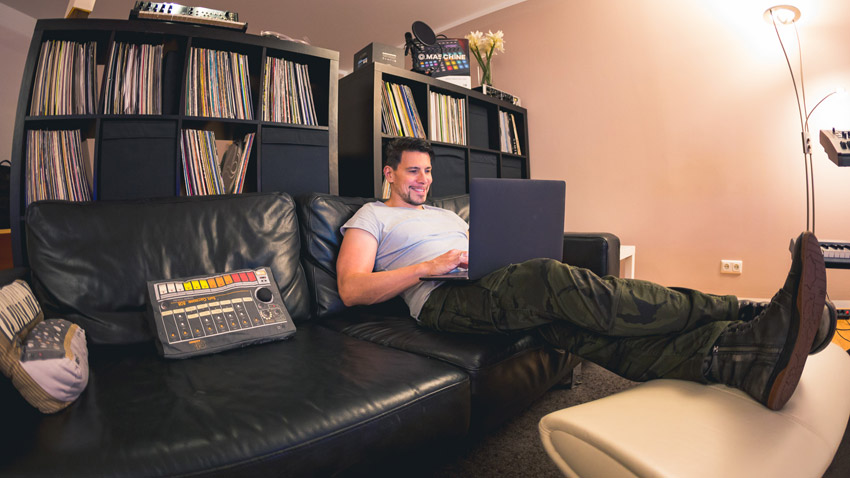Thomas Gold on genre identity and why piano will always be the king of instruments
Electronic music is no longer about genres, reckons the German DJ/producer. Pop, club, underground or mainstream - it’s all music

Frank Thomas Knebel-Janssen was only seven years old when his mum took him to a Yamaha-sponsored technology show. While most kids were wiling away their weekend watching cartoons and building Lego spaceships, young Thomas was drooling over the recently released DX7.
“There was a man on stage playing songs on a synthy-organ machine and I immediately fell in love with the sound,” explains the man we now know as Thomas Gold. “I can remember looking at my mum and saying, ‘That’s what I want to do. I want to learn the keyboard like him’.
“She must have known I was interested in music, because I was always dancing around the house, singing to Madonna and Michael Jackson. So my parents arranged for me to have keyboard lessons. I didn’t realise it at the time, but I was already sorting out my future!”
With 20-odd successful years behind him, that future looks fairly secure. Alongside a string of classy club tunes and chart-friendly anthems, Gold has tweaked and remixed everyone from Adele and Guetta to Fatboy Slim and Gaga.
Most of those productions were put together in his current studio, located in the basement of his Berlin house. “It’s separate from the house, but it still feels like home,” says Gold. “The perfect place to make my music.”
You’ve always been a producer happy to drift between the electronic underground and mainstream pop. Does that make it difficult to give your music a ‘name’?
“I think that’s something we all find difficult these days. It’s a conversation that happens every week: what is this track? What are we making here? What do we call this music? At the start of my career, maybe I would have called it trance, but now there's a new version of trance. This new version is still very melodic, but it feels slower.
Get the MusicRadar Newsletter
Want all the hottest music and gear news, reviews, deals, features and more, direct to your inbox? Sign up here.
“Then I hear labels like future house, vintage house, another version of progressive house, bass house, housey house. Ha ha! Where is the line between all these types of music? Personally, I don’t think anyone can give you the perfect answer to that question, because it will change from person to person and country to country.
“All this confusion might seem like a problem for some people, but, for me, it’s an exciting time to be alive. There are many hearts beating inside my chest… not just a club heart. I like pop music, I like underground music. I like house and trance. I am a fan of music. Not so long ago, it was difficult to think like this. You have the little box you live in and that’s it. ‘Oh, you’re making a pop track? That’s not cool!’”
You didn’t mind ruffling a few feathers?
“But who decides what is cool or not cool? It is just an opinion. Everything that’s happened to electronic music over the last ten years has helped to break down all those barriers and shatter those opinions. It also made me realise there is more than one way to make music. I don’t just have to make ‘this’ music. Maybe I want to make ‘this’ music and ‘this’ music, too.
“As a musician, as a producer and as a simple music fan, I have always been interested in everything. I want to be inspired by different sounds and I want to get as many different ideas out into the world as I can. To answer your original question: is my music hard to categorise? Yes. And I like that. I like it a lot!”
In the studio, does a full-on pop track feel different to a straight club tune? Or, as you say, is it all just ‘music’?
“The thing about pop music is that the structure has not really changed that much since the 60s and 70s. You need to keep it as simple as possible, without letting the song get too boring. When I first started learning the keyboard, I played a lot of pop songs and I began to understand the power of those simple chords. You don’t need to have 100 different chord changes, you don’t need to throw in an F#7b5.
“A good song is about all the elements working together. Obviously, the vocal is carrying a lot of the weight, so if you get too complicated with the chord structure, you’re going to run into problems. If you want to add a few jazzier chords to give the song a little bit of colour, that’s OK, but make sure you leave enough space for that colour to shine through.
“Whether it’s a pop song or something for a club set, I generally start on the piano. Even after all these years, it’s still my favourite instrument because it’s so pure and clean. You can put your chords together and hear whether they work… do they have that basic strength that makes a good song?
“With synths and pads, it’s very easy to get side-tracked by all the effects and the twisting of the sounds, but with the piano, your chords are naked. If it works on the piano, you generally find that, once you start adding all the pads and the effects, the song will start to grow and grow. It will sound even better. But… you must always place your song on solid ground.”
Whether it’s a pop song or something for a club set, I generally start on the piano. Even after all these years, it’s still my favourite instrument because it’s so pure and clean.
What if you’re starting with a vocal?
“The recent single, Dreamer, started out as a vocal with a very simple backing track. With that particular song, I did introduce a drum loop to give me an idea of the groove, but then I immediately took it over to the piano and started playing around with chords. When I have those two elements, I can open Logic and start putting together all the other bits of the song.
“I don’t think there’s ever been a case where I will start a song in Logic. By that, I mean, it is not a normal situation for me to start with… let’s say, a harsh lead line from Serum. I would find that too distracting. The song has to take shape and the melodies have to be in my head before I really start work on the computer.”
Always Logic?
“I was with Cubase in the early days, but I switched to Logic because, back then, it was a cheap alternative. That was maybe 15 years ago and Logic has become my musical living room; it’s a place where I can relax and feel comfortable. The workflow feels very natural and that means I don’t have to spend too much time worrying about how to do this or change that.
“There have been times when I thought about switching back to Cubase or moving to Ableton… especially when Logic was slipping behind on time-stretching. I got the full licence for Ableton and even tried making a few tracks on it, but everything took twice as long.
“Some people say that the sound quality is not so good in Logic. Sorry, but I don’t agree. In the studio, it’s my ideal DAW. Even the onboard tools like the EQ are pretty good. OK, I’ll admit that if I’m getting into some seriously complex EQ work, I’ll pull up something from FabFilter or a Pultec, but if I’m just cutting the lows from a bassline, the Logic EQ is more than adequate.”
What kinds of sources do you use for bass sounds?
“Again, Logic is pretty good. The ES-1 is one of my stock bass sounds, usually for the real sub-sub-stuff; very warm and very fat. On top of that, I’ll add something from the Arturia Moog, Serum or Sylenth. And Massive, of course. It’s been on my computer for a long time, but it’s still my go-to synth. For bass sounds, it’s just so… full of energy. You have that very solid bottom end, but it still has the power as you move up through the frequency range. Programming can be tricky if you dive too deep, but if you keep it simple, it’s a very welcoming synth. Don’t be afraid to start with a preset that has the right vibe for your song. With a few tweaks, you can give it your own character, but still keep that Massive quality.”
All heavily processed?
“Yeah, I use a lot of compression and saturation on my basslines. FabFilter’s Saturn will always be lurking in there somewhere, but you have to make sure you target your saturation on the right frequencies. Just aim for the low-mids or you’re going to fill up way too much space. It will all start to get too messy because the bassline and kick drum will be fighting for air.”

Who gets top billing: the kick or the bassline?
“It really depends on the song. If it’s a club tune, the kick takes control of the bottom end. All the way down to 35 or 40 Hz; anything below that just doesn’t make sense to me. The bassline starts working around 75Hz, up to about 130Hz. Even though the kick is dominating, you still need to carve out a little bit on the EQ to make some room for the bassline. Spend plenty of time on sidechaining, because that’s where you pull the two together… they need to be separate entities, but they must work as one.
“If I’m working on a pop tune, things work the other way around. The bassline provides the soft, warm pillow for the song to rest on, while the kick drum emphasises the rhythm. The main problem here is that, because the bassline is taking the dominant role, you need to be very careful about not making it too complex. Especially when it’s a pop song.
“There is no secret formula for writing a bassline, but I usually start by following the root notes of the chords and gradually bringing in a bit of movement and magic. Do you need something that will counter the main melody? Maybe you just need a simple off-bass that follows the chords.
“One thing I have definitely noticed when I’ve been DJing is that a messy bassline will ruin a song. If you’re in any doubt, stick to the simple option. There is, of course, one more piece to the bass puzzle: good monitors.”
The bigger the better?
“Size can be helpful, because it gives you a real sense of how much bass is floating around, but it’s far more important to know your speakers and your room. I can still remember when I first got the chance to play one of my tunes in a club. I had spent so long trying to create the right mix, but as soon as I heard the song on decent speakers… I was so depressed. It sounded terrible.
“There is always the temptation to add more bass because bass makes the song feel powerful. Unfortunately, if the bass is too powerful, it will kill your song. All you hear in the club is ‘whuum-whuum-whuum’.
“I use two sets of monitors: the Barefoot MicroMain 27s and ATC 150s. I’ve spent many years learning to ‘read’ these speakers and know the levels that feel right for a club mix or a radio mix. It’s the same with my studio space: I know it and I trust it. If I’m working in a new space on new monitors, it always takes me a couple of days to get used to them. Learn to read your monitors like you would learn a new piece of music; eventually they will begin to tell you what’s really happening in a mix.”
Are we ever going to find an answer to the bass level/headphone monitoring problem? Have you found a pair of headphones that will give you anything like a realistic bottom end reference?
“Well, this is something that has become increasingly important in the modern music industry. Ten years ago, I made 99% of my music in the studio. Today, I spend a huge part of my life on planes and in hotel rooms, so I need headphones that will give me something close to a realistic mix when I’m working on the laptop. My choice is the Sennheiser HD650s.
“Could I do a final mix on headphones? For me, the bass is the problem. That’s where I still need the studio.”
How long before DJs will be sitting in their driverless cars, heading up to a gig in Manchester, tweaking a final mix on the car’s inbuilt computer, while monitoring on the club-spec sound system?
“That’s no joke, man. It will happen. But what would I do with my hardware… the Virus, the Waldorf?”

Passenger seat drops flat, a couple of add-ons and you’ve got a two-tier keyboard rack! Do you still use the hardware?
“They’re in the studio because I love them, but they never get used. I switched on the Virus a couple of weeks back, but I realised that I needed an extra cable and… it was all taking too long. I just wanted to start making music.”
Can we just ask one final question about your career before you became a full-time producer? You studied economics at college and worked in that industry for a few years. Has that been useful? Especially in an era when being a musician often involves much more than just making music.
“Definitely! Before I became a professional musician, I worked at a big company in Munich, doing a regular nine-to-five job for about three years. Economics isn’t just about making money. The job didn’t teach me any theories about how to maximise my income. It was much more general: learning how to structure your life and your career. Learning to work as part of a team; if you get signed to a label, you become part of that team. But, most important of all, I learned that I am not always right. Sometimes, other people have great ideas and you need to be open to those ideas.”
For updates, videos and upcoming tour dates, catch up on the official Thomas Gold website. Facebook, Twitter at… www.thomas-gold.com


Computer Music magazine is the world’s best selling publication dedicated solely to making great music with your Mac or PC computer. Each issue it brings its lucky readers the best in cutting-edge tutorials, need-to-know, expert software reviews and even all the tools you actually need to make great music today, courtesy of our legendary CM Plugin Suite.
MusicRadar deals of the week: Enjoy a mind-blowing $600 off a full-fat Gibson Les Paul, £500 off Kirk Hammett's Epiphone Greeny, and so much more
“For those who think they know Joel’s story, as well as those who are not as familiar, I believe this two-part film is both a revelation and a surprise”: New Billy Joel doc is on the way










